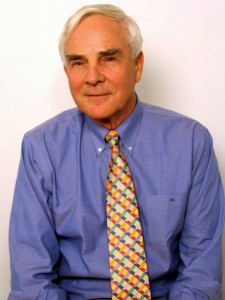John Merrow: Vocabulary is King
Today’s guest blog post is from John Merrow, education correspondent for PBS NewsHour and president of Learning Matters. Merrow is also the author of The Influence of Teachers.
 Recently, while editing a piece for PBS NewsHour about ‘the vocabulary gap’ that develops in the first three years of life, I became acutely aware of the need for public action.
Recently, while editing a piece for PBS NewsHour about ‘the vocabulary gap’ that develops in the first three years of life, I became acutely aware of the need for public action.
We know that about three-quarters of the children who aren’t reading competently and confidently by the end of third grade will never catch up. And while a staggering 91% of African-American boys are below grade level in reading in third grade, this is not a racial issue or problem. It’s a national crisis: 83% of all low-income children are behind.
That’s right: 83 percent.
But it’s not just about vocabulary. It’s about language, conversations, speaking and listening. Kids from affluent homes and kids who succeed in school acquire that wonderful vocabulary through conversations, not vocabulary drills.
The Matthew Effect
Professor E.D. Hirsch Jr., the founder of the Core Knowledge movement and the author of “Cultural Literacy”, welcomes the national attention to our nation’s reading problems but warned against focusing on the abstract concept of ‘reading.’ What matters most is not the skill set associated with reading (phonemic awareness, et cetera), but vocabulary and content knowledge. He sent me a copy of the speech that contains these memorable lines:
“The persistent achievement gap between haves and have-nots in our society is chiefly a verbal gap. There is no greater practical attainment in the modern world than acquiring a bellyful of words. A large vocabulary is the single most reliable predictor of practical, real-world competence…”
He explained what is called “The Matthew Effect” (perhaps hoping the Biblical reference would make me pay closer attention): “For unto every one that hath shall be given, and he shall have abundance: but from him that hath not shall be taken away even that which he hath.” What that means is that the more you have learned, the more you are capable of learning and likely to learn. The reverse is also true: the less you know, the harder it is for you to acquire knowledge.
Learning How to Read, Not Learning How to Learn
What does all this have to do with learning to read, I asked him? Simple, he said. It’s all about content knowledge. You don’t just learn to read in the abstract. You learn facts, content, concrete information. No ‘learning how to learn’ or teaching ‘critical thinking skills’ or ‘comprehension strategies,’ he warned, because those are a dead end. That approach might lead to a temporary up-tick in reading scores, but no genuinely lasting learning.
So what have I learned? First, it’s not about numbers, although the vocabulary gap is real. Reading is the foundation stone, but what matters most is content knowledge. You have to read about something, whether its baseball or Patrick Henry or space travel or a pet dog. And it’s important that all children have common reading experiences — shared content. Finally, closing the vocabulary gap is best done in situations that replicate how vocabulary-rich children actually acquire their larger vocabulary — in conversations, not in cold classrooms where drill is the M.O.
And the more you know, the easier it is to learn more.
To learn more, pick up a copy of John Merrow’s new book, The Influence of Teachers. First Book supporters can get 15% off the retails price by visiting this link and entering the code MUZ4MMPR. Tell your friends! (Assuming your friends are also First Book supporters, of course.)
